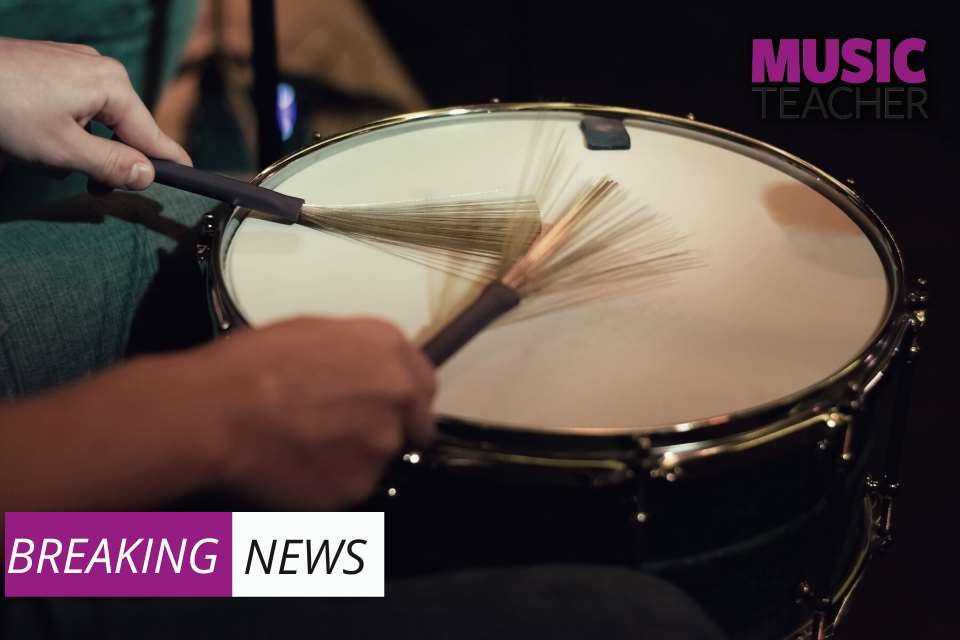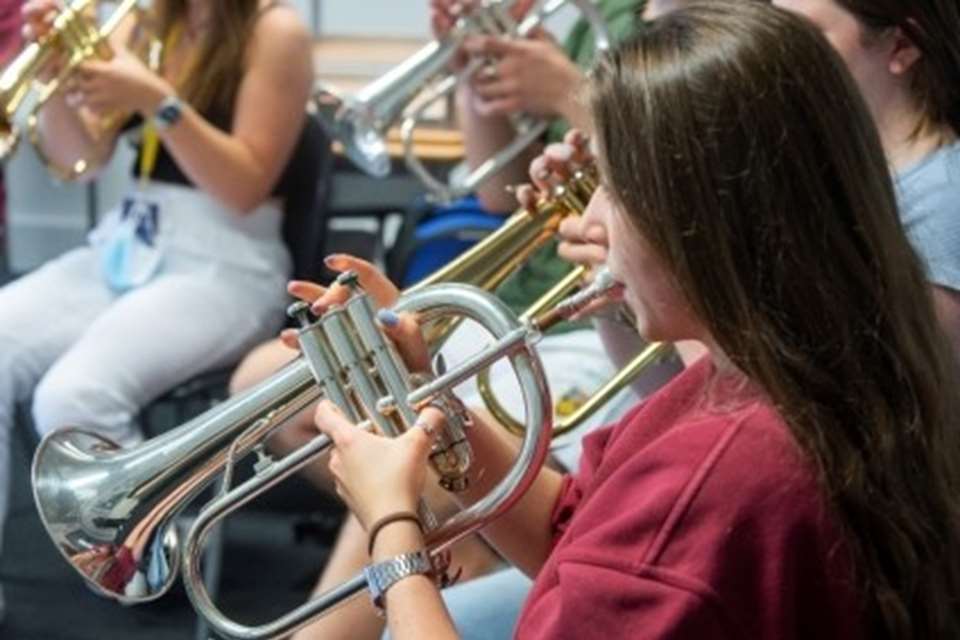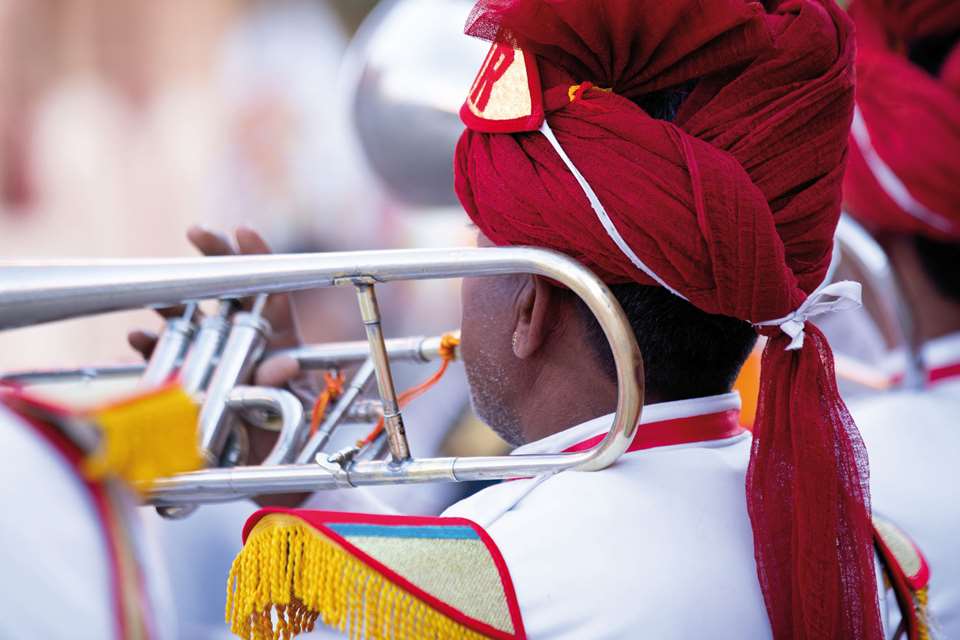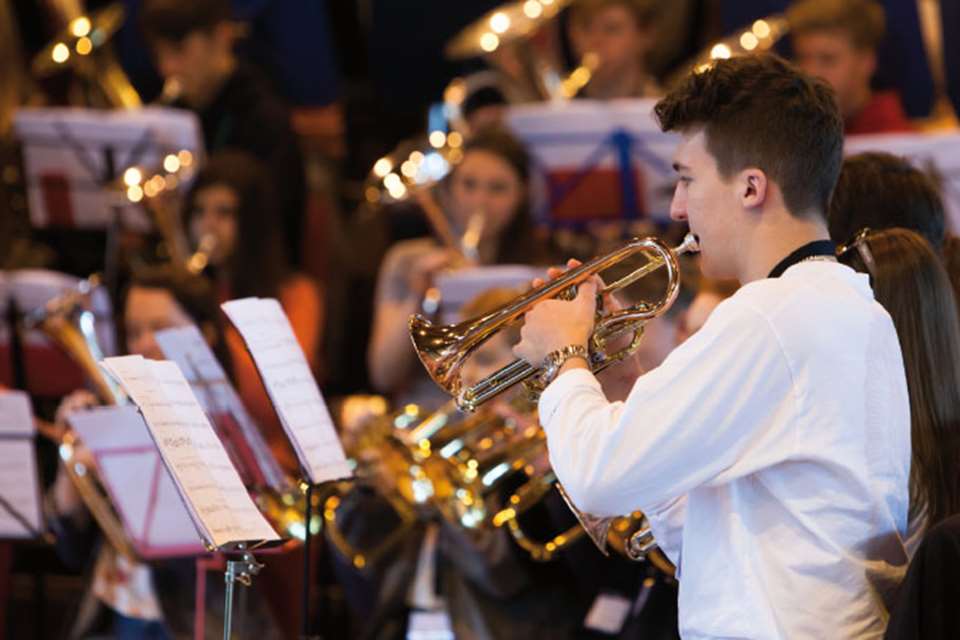The power of (live) music: In-school performances
Kay Charlton
Monday, August 1, 2022
The new National Plan for Music Education re-emphasises the importance of exposing children to live music performance. Having performed with Bollywood Brass in countless schools, Kay Charlton shares some wisdom for both visiting musicians and school teachers hosting them.
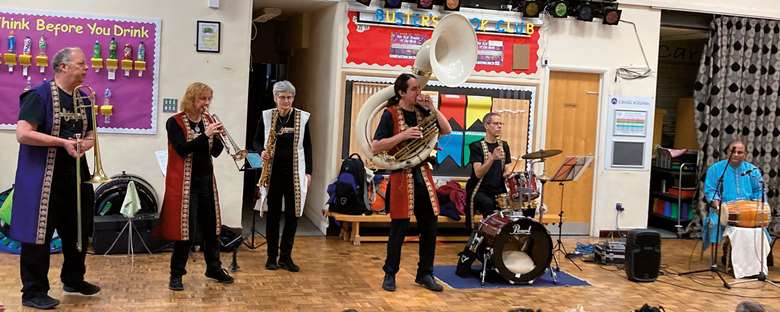
COURTESY BOLLYWOOD BRASS
This year I have been delivering performances and workshops in Yorkshire and Kent primary schools as part of the Bollywood Brass Band's Progression Project. Workshops were with WCET (whole class ensemble teaching) brass and string classes, and we took the opportunity to perform to the whole school where possible. We've had a fantastic time and it reminded me that working with young people is one of the best things about being a musician!
We started in January when we were all in post-Christmas Covid-19 panic, which meant that some schools opted for an online experience, so we performed to a camera with no visible audience and delivered some whole-class workshops via Zoom – an uphill experience for us all, and a challenge many of us have had to face recently. It was a relief when we were allowed into schools.
Teachers were very welcoming and pleased to have live music in school again; however, we received a mixed reception from the children, varying from school to school depending, I'm sure, on whether children had had any access to music over lockdown. I really noticed how hard they found it to sit still and to know how to respond – applause had to be encouraged and concentration was not good. As the year has progressed, I have seen how we as performers, schools, and the children have relaxed and can enjoy performing and/or listening to live music again.
The Times Education Commission (2022) says, ‘Sport, music, drama, art, debating and dance should be an integral part of the timetable – not an optional “extracurricular” add on’. The new National Plan for Music Education advises that children should have the opportunity to enjoy live performance ‘at least once a year’ and that they should listen to a ‘broad range of music’ and see a ‘diversity of roles and role models’. So, it's even more important now than ever that school music leaders include visiting musicians as part of their ‘music development plans’. Ideally, this would happen more than once a year, so that children can see how to perform, learn to be an audience, and see live musicians in their school.
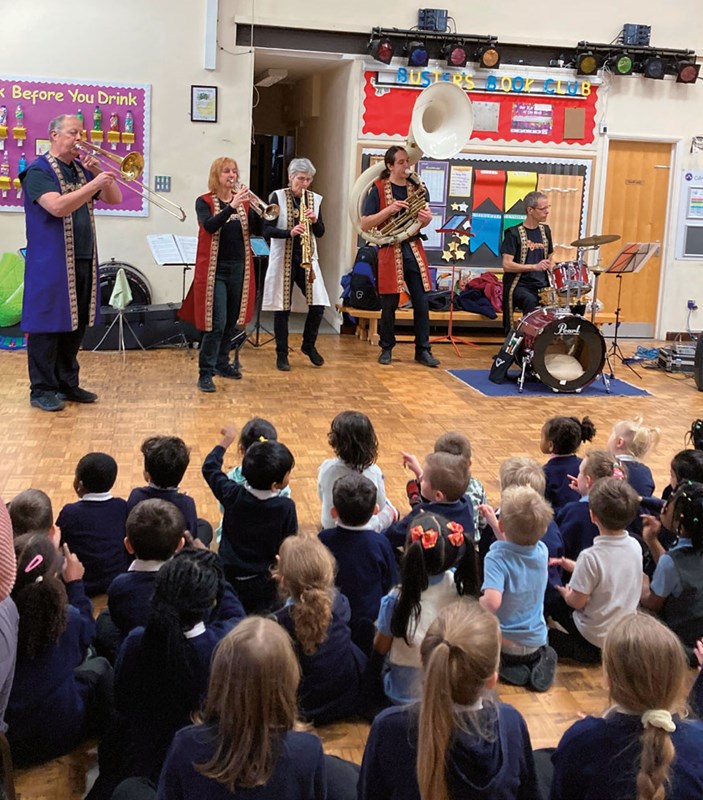
Being a visiting musician
Putting on a good performance for children takes thought and planning – it is an opportunity for children to meet real-life performers, find out about their work, and to hear instruments up close, so it's a big responsibility. Introduce your instrument in an engaging way using child-friendly language; explain how the sound is produced, throw in age-appropriate terminology, and mention the elements, or interrelated dimensions, of music – pitch, dynamics, timbre and so on – as part of your demonstration. Teachers will thank you for bringing these words to life, so be sure to do it musically; no-one wants to hear a lecture about pitch – voting for which instrument sounds higher/lower (because it's smaller/bigger) is much more fun. Do find out what level the children are at, and primary and secondary schools obviously need different approaches.
Practicalities
- Be on time – give yourself plenty of time to travel, to find the school, and park.
- Have your DBS in order, dress appropriately, and mind your language.
- Always ask participants and staff for feedback – it's best to do this before you leave the premises.
- Reflect on the feedback and revise your approach if needs be (also, good feedback will help if you are applying for funding). On feedback forms for primary aged children, use child-appropriate language or smiley faces that can be ticked, for example: did you ‘Love it’, was it ‘OK’, was it ‘yuk!’?
Audience participation
Whatever age your audience are, get them involved. Can they name this instrument? How does it make a sound? Hands up when you hear the chorus; clap this pattern here. If you are also doing a workshop, then watching how children react during your performance is very informative – are they clapping in time, are they responding musically?
You can tell a lot about a school by the way children enter the hall and sit down.
As a visitor, there's not much you can do about the way children behave, as this comes from the school ethos. If your audience is very lively, then keep talking to a minimum; don't talk over them. Try waiting for quiet before you speak or start playing; if that doesn't work, an appealing look to the nearest staff member can help; this may get you nowhere and ploughing on is the only option! Ultimately, the music is the focus and if your audience never settles down for verbal introductions, let the music do the talking.
If you have a performing group coming to your school:
Give performers the right space for the performance/workshop. It may be loud, so don't put the little ones right in front of the big shiny trombone, and preferably don't use the hall that is surrounded by classrooms. Make the most of your visitors: cram the whole school in, invite all teaching staff and ask them to leave their marking behind so that they set an example in how to be an audience.
It is hugely appreciated if you fill in the feedback forms. Often, school performances can only take place with funding – your feedback will help the group reflect on their delivery and a good quote will help them get the funding to return. Also, make sure everyone knows musicians are coming, especially the office – over many years of school visits, I have occasionally arrived to blank looks from the office and premises staff. It's also helpful if the teacher has arranged parking and for someone to meet the group and help transport equipment.
Finally, enjoy the show! In my experience as a musician, it's one of the best gigs you can get.
Quotes from staff
- ‘The visit was a great boost to most children, and they thoroughly enjoyed taking part in call and response, shouting, and body percussion, as well as the playing.’
- ‘It has been very enjoyable as it is not a genre of music I am familiar with; the pupils have also enjoyed listening and performing it.’
Quotes from children
- ‘Prakash was amazing. I couldn't believe how fast he could drum!’ (Joshveer)
- ‘I liked Prakash's story about how he learnt to play his instruments and how much he had to practise. He never gave up.’ (Rueben)
- ‘I liked everything – they were well amazing!’
- ‘Sad Moon made me feel like I can picture it inside my head.’
- ‘I liked hearing a different style of music.
- ‘Definitely 10/10.’ (Evie)
For more information on the Progression Project, contact bollywood@bollywoodbrassband.co.uk.


